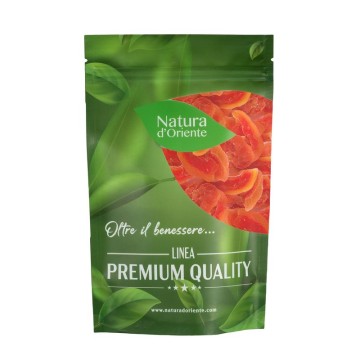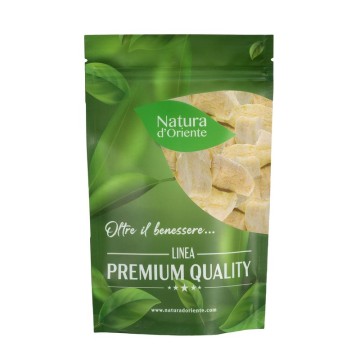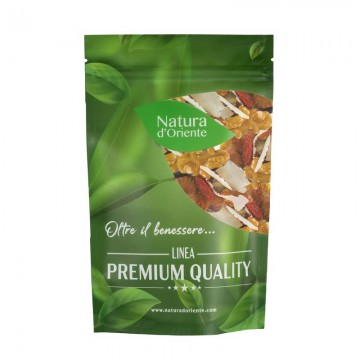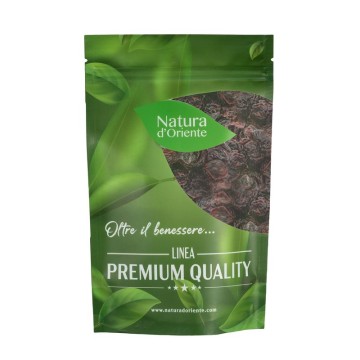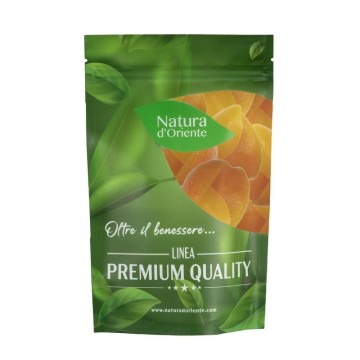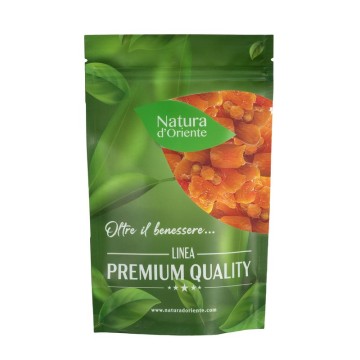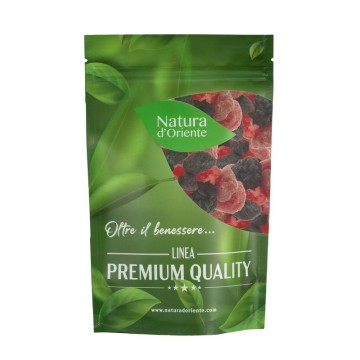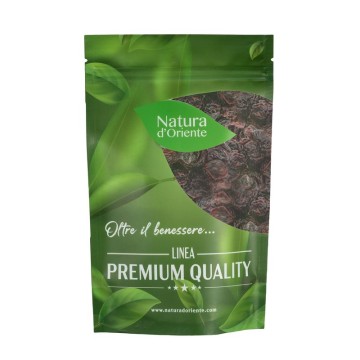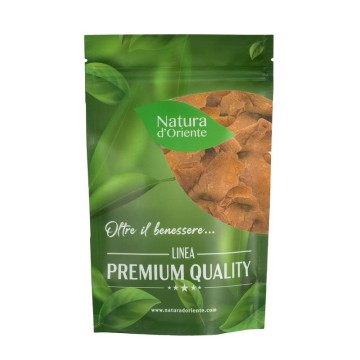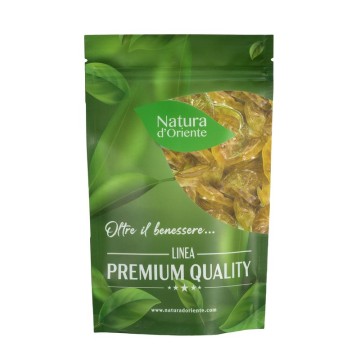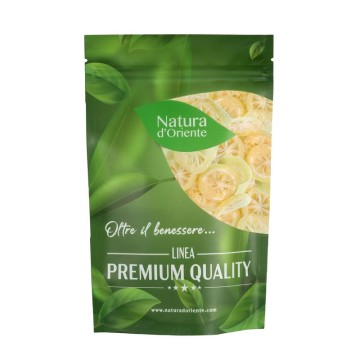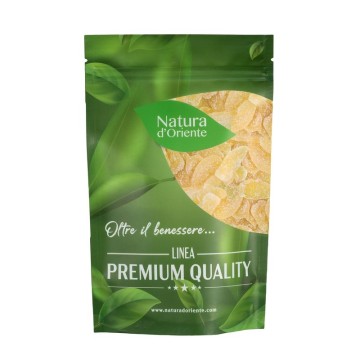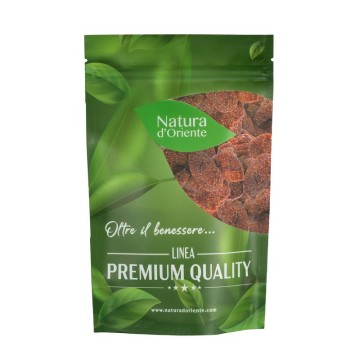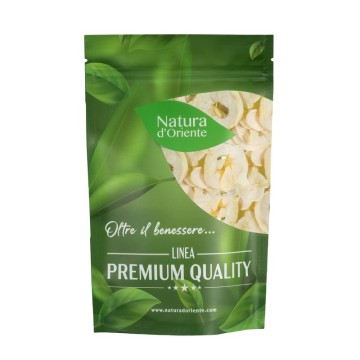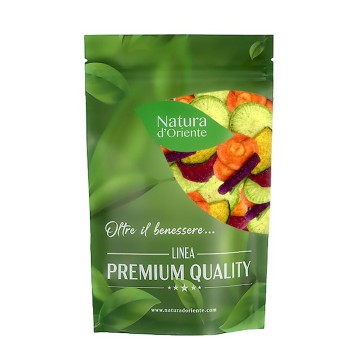Natural mango dehydrated without sugar
This fruit, which comes from tropical areas, is in great demand for its pleasant and sweet flavor, but it also has many nutritional properties. The mango, in fact, is rich in vitamins and minerals. Even in the dried version, and especially without added sugars, it nourishes us beneficially and with energy characteristics.
Natural mango dehydrated without sugar: properties and benefits
The delicious pulp of the mango is considered rich in nutrients favorable for the well-being of our body.
The nutritional components of mango confer beneficial properties, thanks to the high availability of vitamins, mineral salts, antioxidants - substances that our body needs for protection and proper functioning.
In the natural and sugar-free version, dried mango can become an anti-fatigue, energy and tonic supplement.
In the sugar-free dehydrated mango version, it is ideal as a snack, as it retains nutrients and calories - beneficial for athletes and students looking for an energizing food.
It is a rather vitamin-rich fruit , especially vitamin A. It is an essential substance for maintaining good eyesight, and a strong immune system. Vitamin A can also improve skin conditions such as acne. Thanks to the beta-carotene contained in natural mango, it can prevent the negative effects of sunlight, such as skin aging.
The most important substance in mango is potassium, of which it is an excellent source especially in the natural version. Potassium is an element present in many of our physiological processes such as muscle contraction, the defense of the right hydro-saline balance and the regulation of blood pressure.
The presence of vitamin C strengthens the potential of natural mango, in which this antioxidant element is present in good quantities - albeit reduced with dehydration. Vitamin C plays a beneficial action on our immune system, as well as being involved in the synthesis of collagen, therefore essential for the beauty of the skin. Furthermore, it is an important vitamin for the correct assimilation of iron.
In natural mango, the supply of Vitamin E makes the fruit a valid reserve for our body, of this important antioxidant vitamin.
Even in the dehydrated version, natural mango slices contain soluble fibers in good quantities . Fiber helps digestion and cleanses the gastrointestinal system, as well as being useful in reducing cholesterol - it absorbs the most harmful.
Mango contains amylase enzymes, which help the natural absorption of food, helping the proper digestive function, breaking down complex carbohydrates into simple sugars. The fact that it has no added sugars in this type of natural mango also makes it more valid as a food product.
Mango, known for its valid action on carbohydrate metabolism , also supports the regularity of intestinal transit and liver functions.
Like other fruits, natural mango contains antioxidant compounds, which protect our cells from damage caused by free radicals - these are the cause of our cellular aging and, according to some studies, could be associated to some degenerative diseases.
One of mango's typical antioxidants is mangiferin, the subject of numerous studies. Mango represents the most abundant source, and makes available its properties, studied for its ability to stop the production of some free radicals in cells, and for its possible therapeutic properties.
Another useful substance for those who choose natural dehydrated mango is the presence of lupeol, a small molecule that has been analyzed for decades for its anti-inflammatory properties.
Finally, natural dehydrated mango contains doses of folate (vitamin B9) which are transformed into folic acid - a well-known dietary supplement for those who are pregnant. It is an effective element for the correct development of the baby's brain and spinal cord.
There is also a good reputation for mango as a "tonic" for the body. Contains calcium and iron, essential for bone health, especially during pregnancy and after menopause. Iron can help prevent fatigue, which can occur during and after your menstrual cycle.
Its good levels of B vitamins are an asset to avoid stress, stimulate attention and improve endurance during theyou the day.
The manganese and copper content of the dehydrated natural mango ensures various benefits. Manganese is a mineral necessary for functions such as tissue formation, blood clotting, fat and carbohydrate metabolism. Copper is necessary for the formation of red blood cells and the well-being of the immune system.
Another precious substance contained in sugar-free mango is magnesium, a mineral that has properties for the well-being of the nervous system, bones, and also in this case for the metabolism of fats.
Origins and History of cultivation
This fruit derives from the Mangifera indica plant, has its origins in India and commonly grows in all tropical areas, highly prized for its delicious taste for centuries.
It represents one of the fruits linked to the Hindu culture, in fact a mango tree appears in many Indian legends, as sacred to the Hindus. Its leaves were used for garlands to decorate temples, party or wedding banquets, as is also the case in the Philippines.
Mango spread in the 4th century BC in East Asia and later in Africa in the 10th century, through Arab merchants.
The term "mango" comes from the Indian phrase Tamil maangai, which in Portugal became "manga" - a word mentioned in an Italian text in the 16th century. Through the Portuguese, in fact, the mango tree arrived in South America in the early seventeenth century.
Today mango is grown in many tropical and subtropical countries such as Spain or Sicily; it is considered a true delicacy both fresh and dehydrated, with or without sugar, due to its ease of storage.
The fruit is now available in all markets and in all seasons of the year, especially in the dried mango version.
Plant and Fruit
The Mangifera Indica plant is an evergreen with branches, resinous bark and rough red wood.
The leaves of the plant are pointed and shiny, the flowers bloom pinkish-white or yellowish, but not all bear the fruit of the mango. The fruits, on the contrary, are quite few compared to the flowers, and as a rule require three to six months to ripen, depending on the varieties of Mangifera Indica.
The resulting fruits usually have a reddish-yellow color and are large: the size of a single fruit can be considerable, even exceeding the weight of two kilos.
Nutritional values of dehydrated mango without sugar
Mango contains several useful micronutrients, as we have seen, and is a low-fat fruit but rich in fiber (about 2%). In its version of natural mango without sugar, it is also excellent for the lower intake of carbohydrates.
As a nutritional value, it has an excellent availability of minerals such as potassium (about 280 mg per 100 g), magnesium (about 20 mg per 100 g), copper (about 0.3 mg per 100 g), manganese (about 10 mg per 100 g), and phosphorus (about 50 mg / 100 g).
Its content of vitamin B6, vitamin E (about 4 mg / 100 g) and beta-carotene (about 500 µg) - precursor of vitamin A are also good. The quantities of Vitamin K (13.2 µg) are also valid. ). Although with some loss due to dehydration, vitamin C may be present (about 60 mg per 100 g).
Among folate, there is vitamin B9 (folate - folic acid about 68 µg), essential for the synthesis of nucleic acids and some amino acids. In addition to other B vitamins such as B1 (thiamine about 0.06 mg), B3 (niacin about 2 mg), B6 (pyridoxine about 0.3 mg).
Dehydration enhances the properties of mango , and makes it equally beneficial in effects.
How to consume sugar-free dehydrated mango in the kitchen or as a snack
Its sweet and appetizing taste is good for breakfasts, snacks or sweets, as snacks. Above all, since it is a natural sugar-free mango, when dehydrated it can be used as a hunger-breaking snack, during diets.
In the kitchen, it can be used to flavor yogurt, smoothies, fruit salads or mixes of cereals but also in salads for those who love the sweet-sour taste.
Like many dehydrated fruits it can be used for sweet preparations and toppings such as cakes, cupcakes, muffins, ice cream tops.
We remind you that dried mango is a fundamental ingredient in Thai cuisine , to flavor second courses or desserts.
The sugar-free version of natural dehydrated mango is often used as a snack for athletes, also for the antioxidants and minerals it contains; in fact it can also be used to create energy bars.
Mango
![]()
![]()

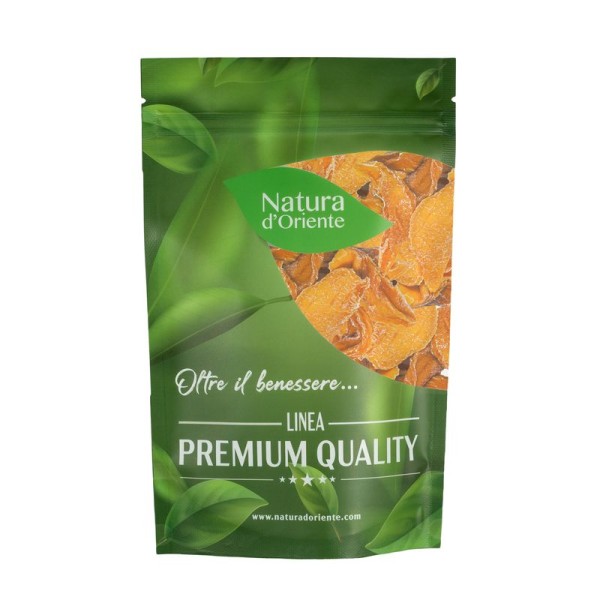









 No reward points for this product.
No reward points for this product.

